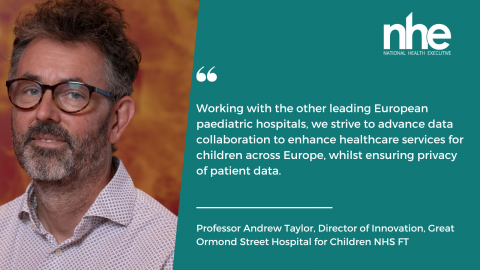Great Ormond Street Hospital (GOSH) is helping lead a collaboration across Europe to revolutionise child health data and accelerate innovation.
GOSH is one of six leading children’s hospitals in Europe that make up the PHEMS project consortium.
The ultimate aim of the PHEMS project is to overcome barriers that are hindering collaboration on health data between different countries by developing and validating a decentralised health data ecosystem.
What this means is a data environment that allows clinicians to analyse health data across hospitals, but while the data remains in its original location. This enables each site to maintain authority over their own patient data and complies with EU and national laws.
New technologies and governance structures will be developed so that the PHEMS programme can synthesise and anonymise data to ensure researchers can access information while confidentiality is still protected.

The project started in October 2023 after HUS Helsinki University Hospital in Finland helped secure significant EU funding. PHEMS will run until September 2026 using investment from Horizon Europe and UK Research and Innovation.
The director of digital and innovation services at HUS New Children’s Hospital, Katariina Gehrmann, said: “One challenge with algorithmically anonymised and synthesised datasets is the lack of evidence on their validity and utility for real-world needs in research or healthcare management.
“Therefore, we shall perform studies on three clinical use cases and aim to generate evidence in different clinical areas and in the management of healthcare operations.”
The first clinical use case is being led by GOSH and centres around the operational management of cardiology patient pathways across four hospitals. This will be benchmarked using a standardised data model known as OMOP (observational medical outcomes partnership).
Alongside GOSH and HUS Helsinki University Hospital, the PHEMS consortium hospital partners include:
- Erasmus Universitair Medisch Centrum Rotterdam – Netherlands
- Azienda Ospedaliero-Universitaria Anna Meyer – Italy
- Hospital Sant Joan de Dé – Spain
- Bērnu klīniskā universitātes slimnīca – Latvia
Technology partners from the UK, Finland, Netherlands, and Spain are also a part of the project.
GOSH’s director of innovation, Professor Andrew Taylor, said: “GOSH is an international centre of excellence and with our first-of-its kind Data Research, Innovation and Virtual Environments unit (DRIVE) we are one of the most digitally advanced hospitals in Europe. It is exciting and a real testament to our digital maturity that we are in a position to be part of this project.”
Prof Taylor recently authored a piece for National Health Executive’s online magazine outlining the last five years of innovation observed at GOSH’s DRIVE unit. Click here to learn more.
PHEMS is short for Paediatric Hospitals as European drives for multi-party computation and synthetic data generation capabilities across clinical specialities and data types.
Image credit: iStock



















